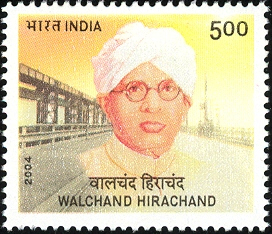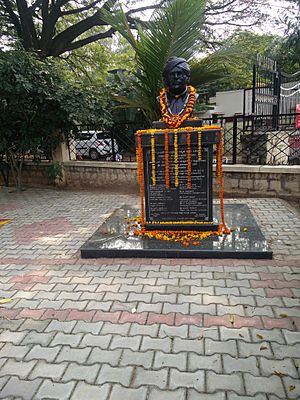Walchand Hirachand facts for kids
Quick facts for kids
Walchand Hirachand
|
|
|---|---|

Hirachand on a 2004 stamp of India
|
|
| Born | 23 November 1882 Solapur, Bombay Presidency, British India
|
| Died | 8 April 1953 (aged 70) Siddhpur, Bombay State, India
|
| Nationality | Indian |
| Occupation | Chairman Walchand Group |
| Relatives | Walchand family |
Walchand Hirachand Doshi (born November 23, 1882 – died April 8, 1953) was a very important Indian businessman. He started the Walchand group of companies. Walchand Hirachand was a true visionary who helped build modern India.
He created India's first modern shipyard, its first aircraft factory, and its first car factory. He also built many other businesses, including construction companies, sugar factories, and engineering firms.
Contents
Walchand Hirachand's Early Life
Walchand Hirachand came from a Jain family. His family was originally from Wankaner in Gujarat but had moved to Solapur. He was born in Solapur, which is now in Maharashtra.
His father, Seth Hirachand Nemchand Doshi, was a cotton trader and money lender. Walchand's mother passed away shortly after he was born. His father later remarried, and Walchand had three half-brothers: Gulabchand, Ratanchand, and Lalchand.
Education and Family
Walchand finished high school in Solapur in 1899. He then went to St. Xaviers College in Mumbai and earned a degree from the University of Mumbai. He also studied at Deccan College in Pune but left early to join his family's business.
In 1900, while still studying, he married Jiu Kilachand. She was the daughter of a banker from Solapur. They had a daughter named Chatur, but his wife sadly died during childbirth. Later, in 1913, he married Kastur Mehta. They had a boy and a girl, but both children passed away when they were very young.
Starting His Own Business
After working in his father's banking and cotton business for a few years, Walchand realized it wasn't what he wanted to do. He decided to become a railway contractor. He partnered with Laxmanrao Balwant Phatak, a former railway clerk. Their company was called Phatak-Walchand private limited.
Walchand was very good at railway construction. But he was always looking for new business ideas.
A Visionary Leader
Walchand was known for his big dreams and strong vision. Some people thought his ideas were too grand, but he always found a way to make them happen. He was especially good at managing people, meeting deadlines, and finding money for his projects.
Many of his projects needed a lot of money. Even though he didn't always agree with the government taking over his businesses, like the shipyard and aircraft factory, these companies might not have survived without government help. The government also needed these industries for its war efforts.
Walchand was also smart about using the media. He knew how to get public support for his projects. This was important during the time of the British Raj, when it could be risky to go against the government. He worked closely with British officials but also supported the Indian independence movement. Many of his projects were opened by famous freedom fighters. He managed to balance these different forces very well.
Walchand helped start the Free Press of India, a national news agency, in 1927. He also supported the Indian National Congress and helped fund its activities. He even spoke to Mahatma Gandhi about protecting Indian industries and ending the Civil Disobedience Movement for the sake of business.
Building India: Construction Projects
Walchand's first big success was in the construction business. His company, Phatak-Walchand private limited, built many railway lines and government projects. In 1920, his company joined with Tata Construction Company to take on bigger jobs.
Some of their major projects included:
- Building tunnels through the Bhor Ghats for a railway line from Mumbai to Pune.
- Laying water pipes from Tansa lake to Mumbai.
- Building tracks for the Barsi Light Railway.
- Constructing bridges over the Indus River and the Irrawaddy River in Burma.
Walchand led all these projects. In 1929, he became the managing director. In 1935, the company was renamed Premier Construction. In 1926, he also founded Hindustan Construction Company, which is now a major construction firm in India.
Sugar and Sweets
In 1908, Walchand started Walchandnagar Industries. It began as a large sugar farm. Over time, it grew to make sugar machinery, plastic goods, and even parts for India's defense and space programs. Walchand made his brother, Gulabchand, the chairman to manage it.
Walchandnagar Industries was even affected by sanctions from the United States because of its role in India's nuclear program, but these were lifted in 2001.
In 1933, Walchand also started Ravalgaon Sugar Farm, which began making sweets in 1942. Today, Ravalgaon Sugar is a leading company in the Indian confectionery market.
India's First Shipping Company
After World War I in 1919, Walchand and his friends, Narottam Morarjee and Kilachand Devchand, bought a steamer called the SS Loyalty. They started The Scindia Steam Navigation Company Ltd.. Walchand believed that the shipping industry would grow a lot after the war.
At that time, British companies like P&O controlled most of the shipping. Walchand's company was the first true Indian shipping company. Mahatma Gandhi often wrote about it in his newspapers, supporting Indian-made goods and the boycott of foreign products.
The company faced tough competition but managed to survive. Walchand became the Chairman of Scindia Steam in 1929 and stayed in that role until 1950. By 1953, his company handled 21% of India's coastal shipping.
Building Airplanes
In 1939, Walchand met an American aircraft company manager. This inspired him to start an aircraft factory in India. Hindustan Aircraft began in Bangalore in December 1940, with support from the Mysore State.
By 1942, the Indian government took over the company. This was because it was a very important industry for the country's security, especially during the war. Hindustan Aircraft was later renamed Hindustan Aeronautics Limited.
Starting a Shipyard
Walchand also believed India needed its own shipyard. He started building one in Visakhapatnam in 1940. Breaking tradition, he had Dr. Rajendra Prasad, who was the acting Congress President, lay the foundation stone on June 21, 1941.
The shipyard was named Scindia Shipyard Limited. Its first ship, the Jalusha, was launched by Jawaharlal Nehru in 1948, soon after India became independent. The shipyard later came under government control and was fully nationalized in 1961, becoming Hindustan Shipyard Limited.
India's First Car Factory
As early as 1939, Walchand wanted to build cars in India. In 1945, he started Premier Automobiles near Mumbai. His partners in this venture were Dharamsey Mulraj Khatau and Tulsidas Kilachand, who were also his partners in Hindustan Aircraft.
By 1948, the company began making some car parts in India. The first car rolled out of his factory in 1949. In 1955, Premier Automobiles partnered with Fiat to make engines in India.
Public Service
Walchand was a founding member of the Maharashtra Chamber of Commerce, Industry & Agriculture. He served as its president for eleven years. He also founded the Indian National Shipowners' Association in 1929 and was its president for 19 years.
He helped start the Indian Sugar Mills Association and the Indian Sugar Syndicate. He also played a key role in creating groups like the Association of Indian Automobiles Manufacturers.
Later Years and Legacy
In 1949, Walchand suffered a stroke. He retired from business in 1950. His wife, Kasturbai, took great care of him. She moved him to Siddhpur in Gujarat, a peaceful religious town, hoping he would recover. He passed away there on April 8, 1953.
He was survived by his wife Kastur and his daughter Chatur from his first marriage.
By 1947, when India became independent, the Walchand group was one of the ten largest business groups in the country. The first Indian ship, SS Loyalty, made its first international journey on April 5, 1919, sailing from Mumbai to London. Walchand Hirachand was on board. To honor this important event, April 5 is now celebrated as National Maritime Day in India.
Walchand was a pioneer in many industries. He dared to dream big and worked hard to make most of his dreams come true.
Since Walchand Hirachand did not have any sons, his businesses are now run by the descendants of his brothers, like Gulabchand Hirachand, Lalchand Hirachand, and Ratanchand Hirachand.
Helping Others: Philanthropy
Walchand Hirachand started several charitable trusts during his lifetime. These trusts helped establish new schools, boarding houses, and supported other good causes. Some of the institutions he helped create include:
- Walchand Institute of Technology, in Solapur, India.
- Walchand College of Engineering, Sangli, founded in 1947.
- Walchand College of Arts and Science, Solapur, established in 1962.
- Smt. Kasturbai Walchand College, Sangli, named after his wife.
- Seth Hirachand Nemchand Digambar Jain Boarding, Pune, a boarding house for Jains named after his father.
- Walchand Public School, Sonipat.
Honors and Memorials
- A road in Mumbai is named after him: Walchand Hirachand Marg.
- A road in his hometown of Solapur is also named Seth Walchand Hirachand Marg.
- The Government of India issued a postage stamp in his honor on November 23, 2004.
- A hall at the Indian Merchants' Chamber house in Mumbai is named Walchand Hirachand Hall.
- Walchandnagar, an industrial town near Pune, is named after him.
 | Audre Lorde |
 | John Berry Meachum |
 | Ferdinand Lee Barnett |


